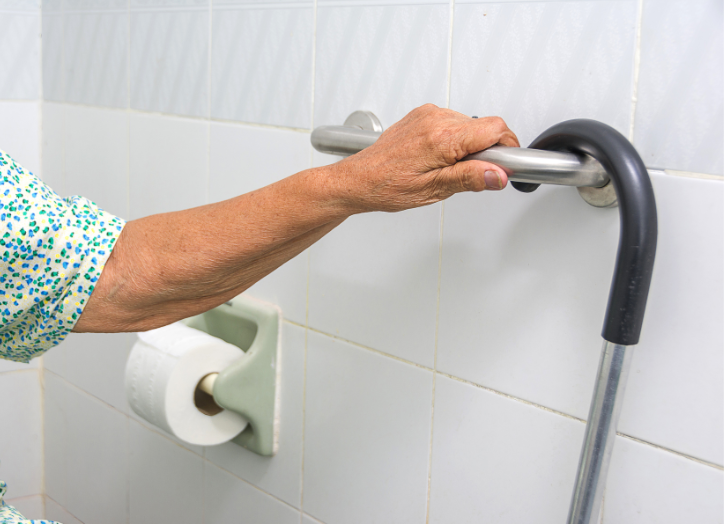Aids and Adaptations

There are a wide range of household equipment and gadgets that you can purchase to make everyday tasks easier.
If you buy your own equipment do your research and shop around. Read the reviews and check the spefications to make sure the product suits your needs. Amazon and Argos sell a wide range of mobility aids and there are a large number of specialist providers such as Disability Horizons and Manage at Home.
Remember used equipment tends to be cheaper. Look on eBay, Gumtree and Facebook Marketplace to see if you can find a bargain.
Loans and long-term hire-purchase agreements are usually more expensive than paying in full.
We have put together a list of useful aids below. There are many more available, so take time to review what is out there before purchasing.
Using the bathroom and toilet
- Long-handled sponges
- Long-handled bottom wiper
- Foot-cleaning mats
- Inflatable bathing cushion
- Shower stool
- Toilet seat raiser
Cooking and eating
- Assistive tin, bottle and jar openers
- Utensils with large rubber grips
- Foam tubing for utensils that can be cut to size
- Hands free automatic can opener
- A trolley to help you move food and drink
- Cutter bowls for easy slicing vegetables
Getting dressed
- Hooks to help pull zips, do buttons up and pull jackets on
- Dressing stick
- A long-handled shoehorn to help put on your shoes
- Gadgets to help put socks, tights and pants on
- No tie shoelaces
- Easy-reach grabbers to help pick up items
Staying safe
- Key safe so carers can let themselves in
- Wearable personal alarm you press to call for help
- Fall detector that alerts a response centre if you have fallen
- A video doorbell
Smart home technology
Smart speakers like Google Home, Amazon Echo and Alexa allow you to use your voice to control things such as music, lights and digital calendars. These can come with smart displays which can be voice-controlled and include a touchscreen that displays information, allowing users to access functions with touch. They also include a camera to make face-to-face calls.
These types of devices allow you to set up routines for example: turn the lights and heating on, play the weather forecast and BBC News at 9.00am in the morning.
Smart plugs can automate almost any plug-in appliance, using your smartphone.
You can operate smart devices from remote locations, rather than needing to adjust them in person. This can be useful for carers. For example, you could adjust the temperature on a smart thermostat remotely to make sure a home is comfortably warm for the person you care for.
A video doorbell can also be monitored remotely from any location to communicate with someone at the door. They can also be operated by voice and allow storage of video for later viewing.
Apply for a needs assessment by social services
Some equipment can be provided by your local authority for free. You will need to ask for an assessment.
Your local authority can help with adaptations to your home such as:
- Grab rails/banister rails
- Ramps or steps
- Intercom system
- Motion-sensor lights
- A wall fixed shower seat
- Grab rails in the bathroom
Apply for a needs assessment by social services (GOV.UK)
Disabled Facilities Grant (DFG)
For more expensive home adaptations, you can apply to your council for a Disabled Facilities Grant (DFG). A means test may apply for any work recommended. Adaptations can include things like:
- Fitting a stairlift
- Walk-in shower
- Downstairs toilet
- Ramps
- Door widening
NHS Continuing Healthcare
Some people with long-term complex health needs qualify for free social care arranged and funded by the NHS. This can include equipment like hoists and powered wheelchairs. You will need to apply for an assessment.
For guidance on the principles and processes of Continuing NHS Healthcare (CHC) in Wales visit: https://gov.wales/national-framework-continuing-nhs-healthcare
VAT Relief
You may not need to pay VAT when you buy and install things that are designed or adapted to support you. Visit https://www.gov.uk/financial-help-disabled/vat-relief to see if you qualify for VAT relief.
Grants for disability equipment
Grant-giving funds give grants to people that meet their criteria to fund disability equipment.
The Motability Scheme lets you lease a car, mobility scooter or powered wheelchair using the mobility component of your Disability Living Allowance (DLA) or Personal Independence Payment (PIP). To check if you are eligible visit: https://www.motability.co.uk/about/how-the-scheme-works/
Article by Citizens Advice Getting a Motability car (Citizens Advice)
Useful links
You can get support and care from the British Red Cross to help you live independently at home or when you return after a stay in hospital. You can hire a wheelchair and toilet aids from the British Red Cross for short-term use.
Scope offers a range of support services for disabled people. This includes information on disability equipment and assistive technology, housing and home adaptations.
Care and Repair helps older people across Wales live in safety and comfort in their own homes. Its services include assisting you to improve, repair or adapt your home and are available to individuals aged 55 or over, or of any age with a disability.
Age Cymru offers free advice to older people on topics such as benefits and arranging care. Obtaining disability equipment and home adaptations in Wales.
Which has reviews on bathing aids, mobility scooters, kitchen appliances and more https://www.which.co.uk/reviews/mobility-equipment/article/guides
